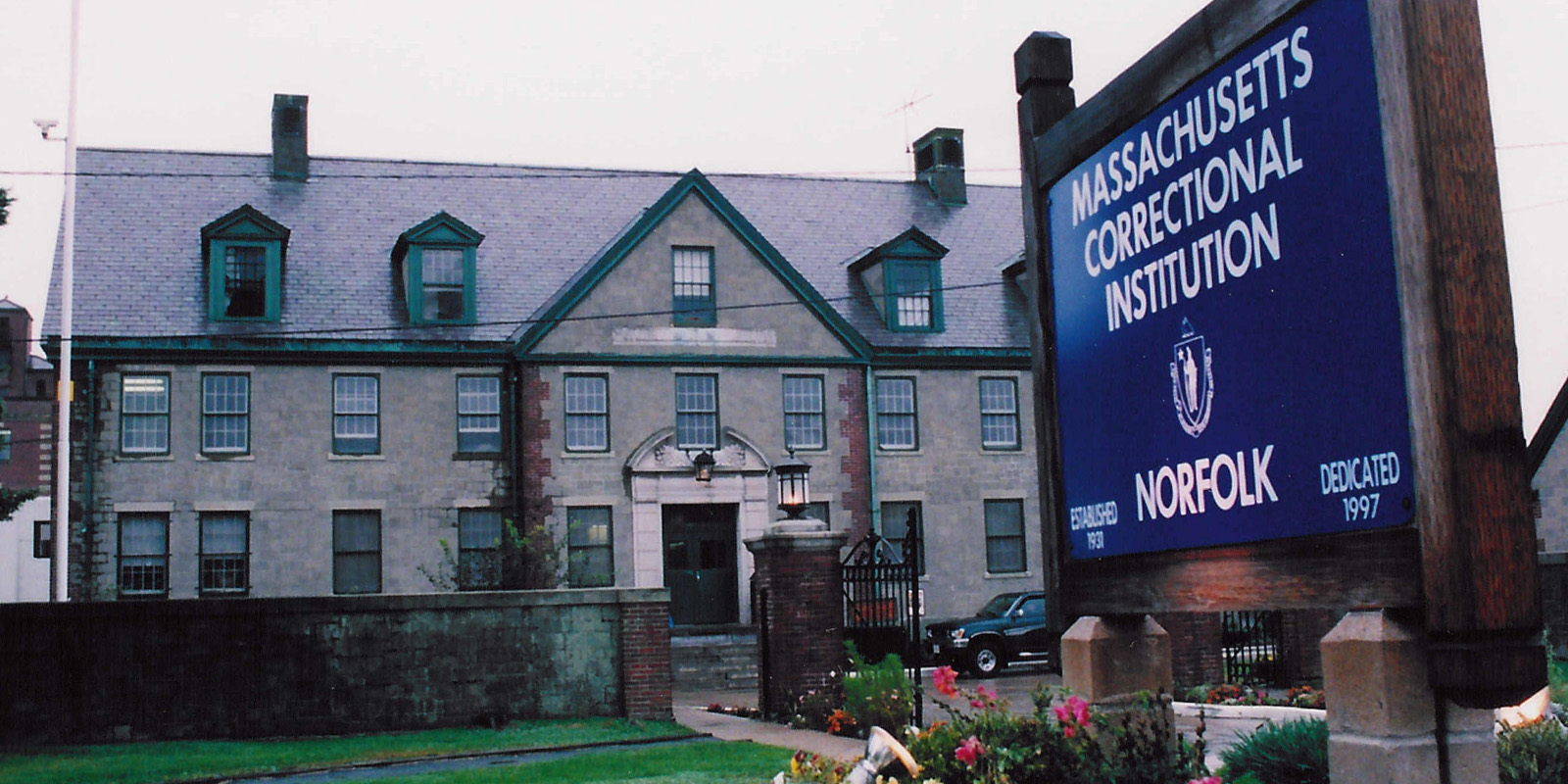
Massachusetts Correctional Institution - Norfolk, where Michelle Lynne Kosilek is housed, is the biggest medium security facility for males in the state. Courtesy of the Massachusetts Department of Correction. Courtesy of Michelle Lynne Kosilek.
Michelle Lynne Kosilek
Michelle Lynne Kosilek received her first bra in 2003, when she was 54. For the next month, she only took it off to wash it in the shower. It had taken her over a decade to be allowed to wear one, and she exercised that right to the fullest.
Incarcerated since 1990, Kosilek is a transgender woman who struggles with significant challenges every day: “Just getting through the day without hearing misogynist remarks from prisoners and staff. Not having a complete body with which to defend my female identity,” she said in a letter dated April 2017.
As part of a project at Northeastern University’s School of Journalism, Kosilek and other Massachusetts-based transgender inmates have written a series of letters over the last year detailing their struggles with gender identity while incarcerated. Kosilek has felt female since childhood, but truly began her transition in prison, suing the Department of Correction for every right she has gained.

Michelle Lynne Kosilek has been serving a life sentence at MCI - Norfolk for over 25 years. She was convicted of murdering her wife, Cheryl McCaul, in 1990. Courtesy of Michelle Lynne Kosilek.
Born April 10, 1949, in Chicago, Illinois, Kosilek says her earliest memory is of her mother Elizabeth Kosilek and her mother’s boyfriend taking a doll away from her at the age of 4 and giving her a wooden airplane instead.
About a year later, Kosilek and her sister Patricia, three years her elder, were left to live with their grandmother, who then also abandoned them after less than a year. They spent the next five years at St. Hedwig’s Orphanage in Chicago, run by nuns Kosilek described as “cruel.”
When she was caught wearing a dress, one of the nuns called Kosilek the spawn of Satan and tore the blue frock. As punishment, she was locked in a closet under the stairs. Kosilek prayed that God would make her a girl.
“Serving a sentence in the prison of your own body because others refuse to admit that neither the prison, nor the key, even exists,” Kosilek wrote, “is no different than being in a concrete and steel prison with a life sentence.”
In 1959, Kosilek’s mother came to get the siblings. That same year, when she was 10 years old, her maternal grandfather started molesting her, keeping her quiet through fear. When Kosilek finally told her mother, she was hit as punishment.
At age 12, Kosilek started prostituting herself, meeting men in restrooms and on street corners. She was drinking and skipping school regularly, while her secret collection of female items grew.
...
Rikki Cordoba, Kosilek’s first trans acquaintance, introduced her to hormones with an estrogen cream. She used it every day, until she started to feel a small lump underneath her nipples. She then adopted the name Lisa and ran away.
She was later arrested and sent to live with a foster family. The family also fostered a 16-year-old boy, who held Kosilek down on his bed one day in 1964 and raped her. She walked out of the home and never looked back.
Kosilek spent time at a reformatory school, where she had no access to girls’ clothes, makeup and the freedom to grow her hair long. Her mother came again to reclaim her in 1965, and they moved into her mother’s childhood home. At the age of 17, she was left truly on her own when, without warning, her mother left again, this time to Tennessee with her boyfriend and his two sons.
“In the 1960s, there was no Internet, no LGBT support groups, no Gay Pride Parade, no transgendered community,” she wrote.
Kosilek got birth control pills containing estrogen from a Chicago-based doctor who exchanged prescriptions for sex. She started growing breasts, but her substance abuse hindered her from formally transitioning to female.
In 1968, when she was 19, Kosilek spent time in Cook County Jail in Chicago for possession of narcotic drugs. She said while she was incarcerated, eight men raped her while she was tied down to a bed frame. She was found bloody and with her eyes swollen closed. Kosilek needed surgery to repair a rectal tear, but her mental trauma was much more painful.
“The spirit’s wounds cannot be sutured, and like a cancer, they metastasize,” she said in her memoir, “Grace’s Daughter,” self-published through Smashwords in 2012 while Kosilek was incarcerated.
Four years later, Kosilek joined the Army to become a mechanic at Fort Leonard Wood, Missouri. While on leave one weekend, she was arrested in possession of marijuana while dressed as a woman, and was discharged.
“Pretending to be male when you know you aren’t is a 24-hour-a-day performance. Speaking, walking, talking, crossing one’s legs, face-language: each gender has its own,” she wrote in her memoir about this period of her life. “Learning to hide by acting male is living a lie.”
...
Kosilek met her first wife, identified only as Brenda, in March 1974 in Chicago. She said they were young and irresponsible, and had a daughter together, which they gave up for adoption two months after she was born and around the time they divorced.
When she met Cheryl McCaul, her second wife, about a decade later, Kosilek had checked in to a residential treatment program after moving to New Bedford and driving a taxi. McCaul believed Kosilek’s gender identity issues would go away if she found the right woman.
“Cheryl knew I was transgender as did my first wife Brenda. Both were bisexual, and met me when I had been living as female, complete with breast development,” Kosilek said in a letter.
During her second marriage, Kosilek earned a bachelor’s degree in counseling psychology while living in Mansfield and worked at Bridgewater State Hospital as one of 57 observers hired to watch patient-prisoners to prevent suicides.
“It was the first such period in my life, where the only conflict was internal: ongoing suppression of my true gender,” she said in a letter.
Kosilek strangled her wife to death after a violent argument on May 20, 1990, that ensued when McCaul allegedly found Kosilek wearing her clothes in their Mansfield home. Kosilek fled to New York, where she was arrested four days later. She was found guilty and sentenced to life in prison.
In 1993, she was able to legally change her name from Robert Kosilek to Michelle Lynne Kosilek, but her repeated requests for medical treatment were denied. Unable to express herself as female, she attempted suicide twice before deciding to sue the Department of Correction.
Due to her legal efforts, she received her first dose of hormones in 2003. She was also granted the right to sexual reassignment surgery in court in 2012, but the decision was overturned.
“I isolated myself for awhile, mostly due to a profound sense of disappointment and shame that I had let all the other transwomen down,” she said in a letter.
The Massachusetts Supreme Judicial Court declined to hear her appeal. Already in her late-60s, Kosilek started reconciling herself with the idea that her remaining years might be just as painful as the last decade.
“Yet I continue to fight – I have to,” she wrote. “For myself and all who will come after, I cannot surrender.”